Analysis of Sultans, Nationalists, and Colonists in Historical Context
VerifiedAdded on 2023/01/03
|6
|1440
|20
Essay
AI Summary
This essay provides an analysis of two historical narratives: Ibn Battuta's visit to Pasai and the experiences of Chinese Muslims in Java. The essay explores the interactions between Ibn Battuta, a Muslim scholar, and Sultan al-Malik al-Zahir, examining their religious discussions and the expansion of Islamic territories. It contrasts this with the challenges faced by Chinese Muslims in Java, including discrimination and forced conversions. The essay highlights the differences and similarities in the social, economic, and political conditions of these societies, focusing on religious wars, economic activities like trade and agriculture, and the influence of Islamic Sharia. The encounters between inhabitants and visitors in both stories, including the impact of conversion and cultural exchange, are also discussed. The essay draws on various sources to support its analysis, providing a comprehensive view of the historical context and dynamics of these societies.
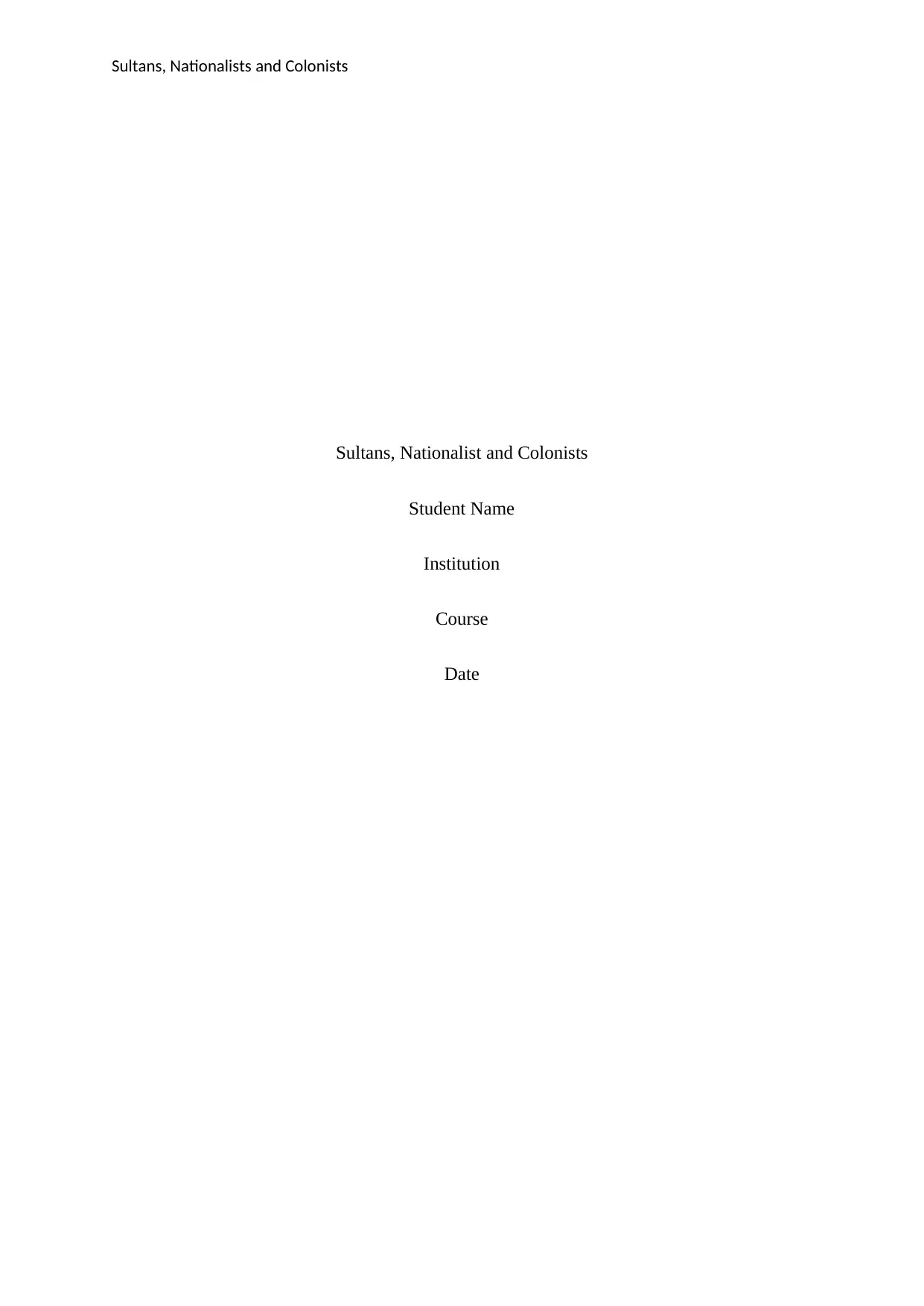
Sultans, Nationalists and Colonists
Sultans, Nationalist and Colonists
Student Name
Institution
Course
Date
Sultans, Nationalist and Colonists
Student Name
Institution
Course
Date
Paraphrase This Document
Need a fresh take? Get an instant paraphrase of this document with our AI Paraphraser
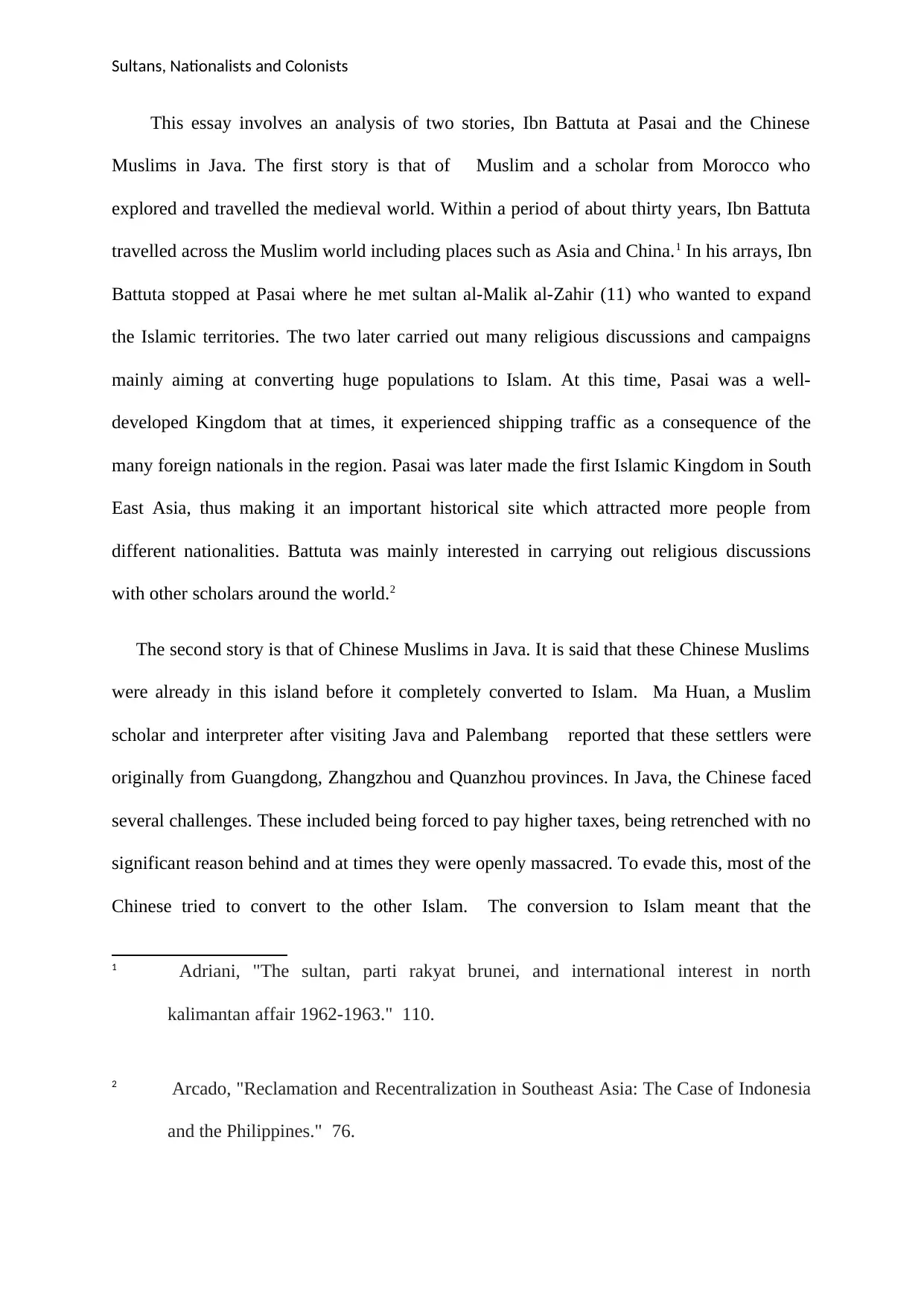
Sultans, Nationalists and Colonists
This essay involves an analysis of two stories, Ibn Battuta at Pasai and the Chinese
Muslims in Java. The first story is that of Muslim and a scholar from Morocco who
explored and travelled the medieval world. Within a period of about thirty years, Ibn Battuta
travelled across the Muslim world including places such as Asia and China.1 In his arrays, Ibn
Battuta stopped at Pasai where he met sultan al-Malik al-Zahir (11) who wanted to expand
the Islamic territories. The two later carried out many religious discussions and campaigns
mainly aiming at converting huge populations to Islam. At this time, Pasai was a well-
developed Kingdom that at times, it experienced shipping traffic as a consequence of the
many foreign nationals in the region. Pasai was later made the first Islamic Kingdom in South
East Asia, thus making it an important historical site which attracted more people from
different nationalities. Battuta was mainly interested in carrying out religious discussions
with other scholars around the world.2
The second story is that of Chinese Muslims in Java. It is said that these Chinese Muslims
were already in this island before it completely converted to Islam. Ma Huan, a Muslim
scholar and interpreter after visiting Java and Palembang reported that these settlers were
originally from Guangdong, Zhangzhou and Quanzhou provinces. In Java, the Chinese faced
several challenges. These included being forced to pay higher taxes, being retrenched with no
significant reason behind and at times they were openly massacred. To evade this, most of the
Chinese tried to convert to the other Islam. The conversion to Islam meant that the
1 Adriani, "The sultan, parti rakyat brunei, and international interest in north
kalimantan affair 1962-1963." 110.
2 Arcado, "Reclamation and Recentralization in Southeast Asia: The Case of Indonesia
and the Philippines." 76.
This essay involves an analysis of two stories, Ibn Battuta at Pasai and the Chinese
Muslims in Java. The first story is that of Muslim and a scholar from Morocco who
explored and travelled the medieval world. Within a period of about thirty years, Ibn Battuta
travelled across the Muslim world including places such as Asia and China.1 In his arrays, Ibn
Battuta stopped at Pasai where he met sultan al-Malik al-Zahir (11) who wanted to expand
the Islamic territories. The two later carried out many religious discussions and campaigns
mainly aiming at converting huge populations to Islam. At this time, Pasai was a well-
developed Kingdom that at times, it experienced shipping traffic as a consequence of the
many foreign nationals in the region. Pasai was later made the first Islamic Kingdom in South
East Asia, thus making it an important historical site which attracted more people from
different nationalities. Battuta was mainly interested in carrying out religious discussions
with other scholars around the world.2
The second story is that of Chinese Muslims in Java. It is said that these Chinese Muslims
were already in this island before it completely converted to Islam. Ma Huan, a Muslim
scholar and interpreter after visiting Java and Palembang reported that these settlers were
originally from Guangdong, Zhangzhou and Quanzhou provinces. In Java, the Chinese faced
several challenges. These included being forced to pay higher taxes, being retrenched with no
significant reason behind and at times they were openly massacred. To evade this, most of the
Chinese tried to convert to the other Islam. The conversion to Islam meant that the
1 Adriani, "The sultan, parti rakyat brunei, and international interest in north
kalimantan affair 1962-1963." 110.
2 Arcado, "Reclamation and Recentralization in Southeast Asia: The Case of Indonesia
and the Philippines." 76.
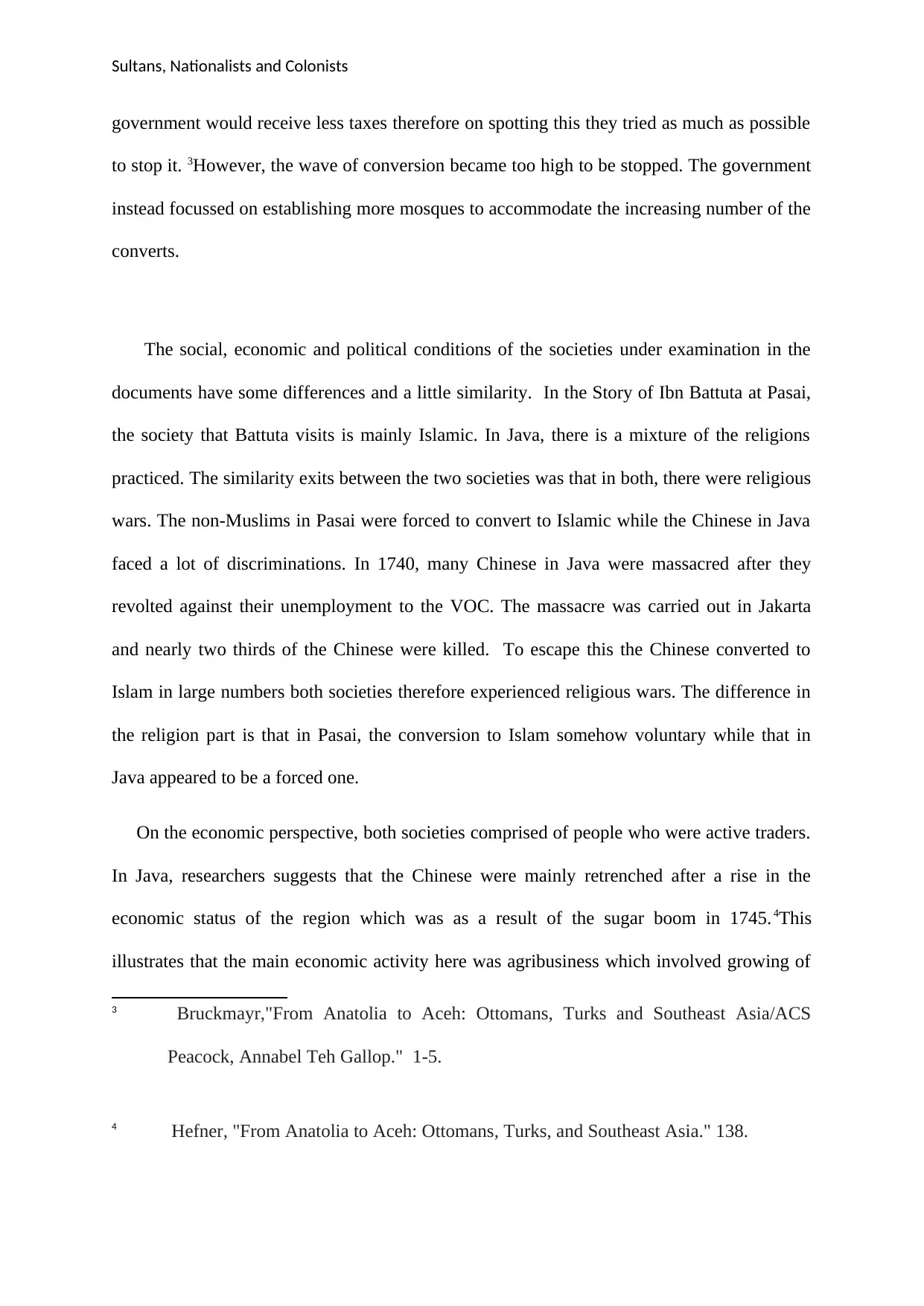
Sultans, Nationalists and Colonists
government would receive less taxes therefore on spotting this they tried as much as possible
to stop it. 3However, the wave of conversion became too high to be stopped. The government
instead focussed on establishing more mosques to accommodate the increasing number of the
converts.
The social, economic and political conditions of the societies under examination in the
documents have some differences and a little similarity. In the Story of Ibn Battuta at Pasai,
the society that Battuta visits is mainly Islamic. In Java, there is a mixture of the religions
practiced. The similarity exits between the two societies was that in both, there were religious
wars. The non-Muslims in Pasai were forced to convert to Islamic while the Chinese in Java
faced a lot of discriminations. In 1740, many Chinese in Java were massacred after they
revolted against their unemployment to the VOC. The massacre was carried out in Jakarta
and nearly two thirds of the Chinese were killed. To escape this the Chinese converted to
Islam in large numbers both societies therefore experienced religious wars. The difference in
the religion part is that in Pasai, the conversion to Islam somehow voluntary while that in
Java appeared to be a forced one.
On the economic perspective, both societies comprised of people who were active traders.
In Java, researchers suggests that the Chinese were mainly retrenched after a rise in the
economic status of the region which was as a result of the sugar boom in 1745.4This
illustrates that the main economic activity here was agribusiness which involved growing of
3 Bruckmayr,"From Anatolia to Aceh: Ottomans, Turks and Southeast Asia/ACS
Peacock, Annabel Teh Gallop." 1-5.
4 Hefner, "From Anatolia to Aceh: Ottomans, Turks, and Southeast Asia." 138.
government would receive less taxes therefore on spotting this they tried as much as possible
to stop it. 3However, the wave of conversion became too high to be stopped. The government
instead focussed on establishing more mosques to accommodate the increasing number of the
converts.
The social, economic and political conditions of the societies under examination in the
documents have some differences and a little similarity. In the Story of Ibn Battuta at Pasai,
the society that Battuta visits is mainly Islamic. In Java, there is a mixture of the religions
practiced. The similarity exits between the two societies was that in both, there were religious
wars. The non-Muslims in Pasai were forced to convert to Islamic while the Chinese in Java
faced a lot of discriminations. In 1740, many Chinese in Java were massacred after they
revolted against their unemployment to the VOC. The massacre was carried out in Jakarta
and nearly two thirds of the Chinese were killed. To escape this the Chinese converted to
Islam in large numbers both societies therefore experienced religious wars. The difference in
the religion part is that in Pasai, the conversion to Islam somehow voluntary while that in
Java appeared to be a forced one.
On the economic perspective, both societies comprised of people who were active traders.
In Java, researchers suggests that the Chinese were mainly retrenched after a rise in the
economic status of the region which was as a result of the sugar boom in 1745.4This
illustrates that the main economic activity here was agribusiness which involved growing of
3 Bruckmayr,"From Anatolia to Aceh: Ottomans, Turks and Southeast Asia/ACS
Peacock, Annabel Teh Gallop." 1-5.
4 Hefner, "From Anatolia to Aceh: Ottomans, Turks, and Southeast Asia." 138.
⊘ This is a preview!⊘
Do you want full access?
Subscribe today to unlock all pages.

Trusted by 1+ million students worldwide
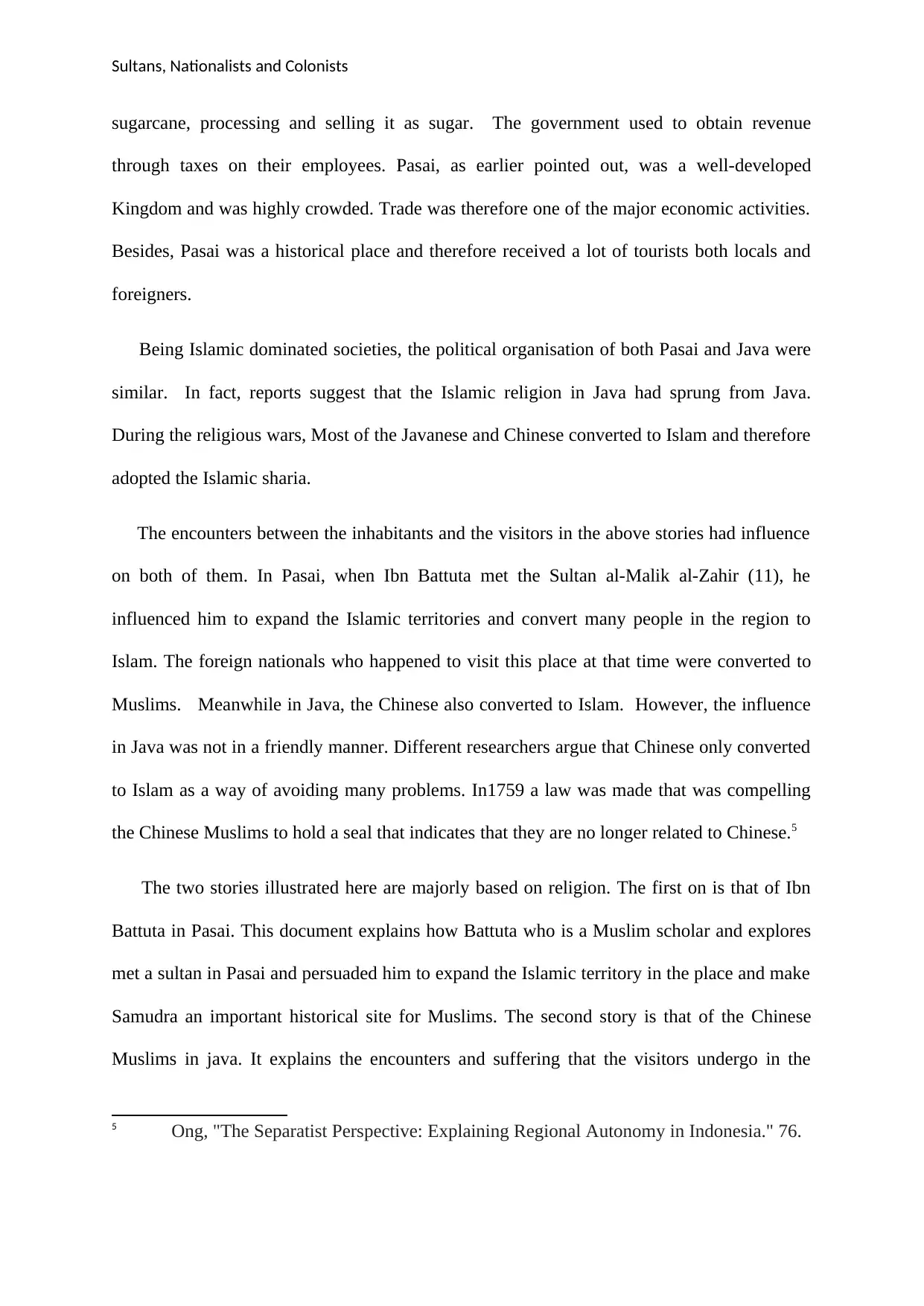
Sultans, Nationalists and Colonists
sugarcane, processing and selling it as sugar. The government used to obtain revenue
through taxes on their employees. Pasai, as earlier pointed out, was a well-developed
Kingdom and was highly crowded. Trade was therefore one of the major economic activities.
Besides, Pasai was a historical place and therefore received a lot of tourists both locals and
foreigners.
Being Islamic dominated societies, the political organisation of both Pasai and Java were
similar. In fact, reports suggest that the Islamic religion in Java had sprung from Java.
During the religious wars, Most of the Javanese and Chinese converted to Islam and therefore
adopted the Islamic sharia.
The encounters between the inhabitants and the visitors in the above stories had influence
on both of them. In Pasai, when Ibn Battuta met the Sultan al-Malik al-Zahir (11), he
influenced him to expand the Islamic territories and convert many people in the region to
Islam. The foreign nationals who happened to visit this place at that time were converted to
Muslims. Meanwhile in Java, the Chinese also converted to Islam. However, the influence
in Java was not in a friendly manner. Different researchers argue that Chinese only converted
to Islam as a way of avoiding many problems. In1759 a law was made that was compelling
the Chinese Muslims to hold a seal that indicates that they are no longer related to Chinese.5
The two stories illustrated here are majorly based on religion. The first on is that of Ibn
Battuta in Pasai. This document explains how Battuta who is a Muslim scholar and explores
met a sultan in Pasai and persuaded him to expand the Islamic territory in the place and make
Samudra an important historical site for Muslims. The second story is that of the Chinese
Muslims in java. It explains the encounters and suffering that the visitors undergo in the
5 Ong, "The Separatist Perspective: Explaining Regional Autonomy in Indonesia." 76.
sugarcane, processing and selling it as sugar. The government used to obtain revenue
through taxes on their employees. Pasai, as earlier pointed out, was a well-developed
Kingdom and was highly crowded. Trade was therefore one of the major economic activities.
Besides, Pasai was a historical place and therefore received a lot of tourists both locals and
foreigners.
Being Islamic dominated societies, the political organisation of both Pasai and Java were
similar. In fact, reports suggest that the Islamic religion in Java had sprung from Java.
During the religious wars, Most of the Javanese and Chinese converted to Islam and therefore
adopted the Islamic sharia.
The encounters between the inhabitants and the visitors in the above stories had influence
on both of them. In Pasai, when Ibn Battuta met the Sultan al-Malik al-Zahir (11), he
influenced him to expand the Islamic territories and convert many people in the region to
Islam. The foreign nationals who happened to visit this place at that time were converted to
Muslims. Meanwhile in Java, the Chinese also converted to Islam. However, the influence
in Java was not in a friendly manner. Different researchers argue that Chinese only converted
to Islam as a way of avoiding many problems. In1759 a law was made that was compelling
the Chinese Muslims to hold a seal that indicates that they are no longer related to Chinese.5
The two stories illustrated here are majorly based on religion. The first on is that of Ibn
Battuta in Pasai. This document explains how Battuta who is a Muslim scholar and explores
met a sultan in Pasai and persuaded him to expand the Islamic territory in the place and make
Samudra an important historical site for Muslims. The second story is that of the Chinese
Muslims in java. It explains the encounters and suffering that the visitors undergo in the
5 Ong, "The Separatist Perspective: Explaining Regional Autonomy in Indonesia." 76.
Paraphrase This Document
Need a fresh take? Get an instant paraphrase of this document with our AI Paraphraser
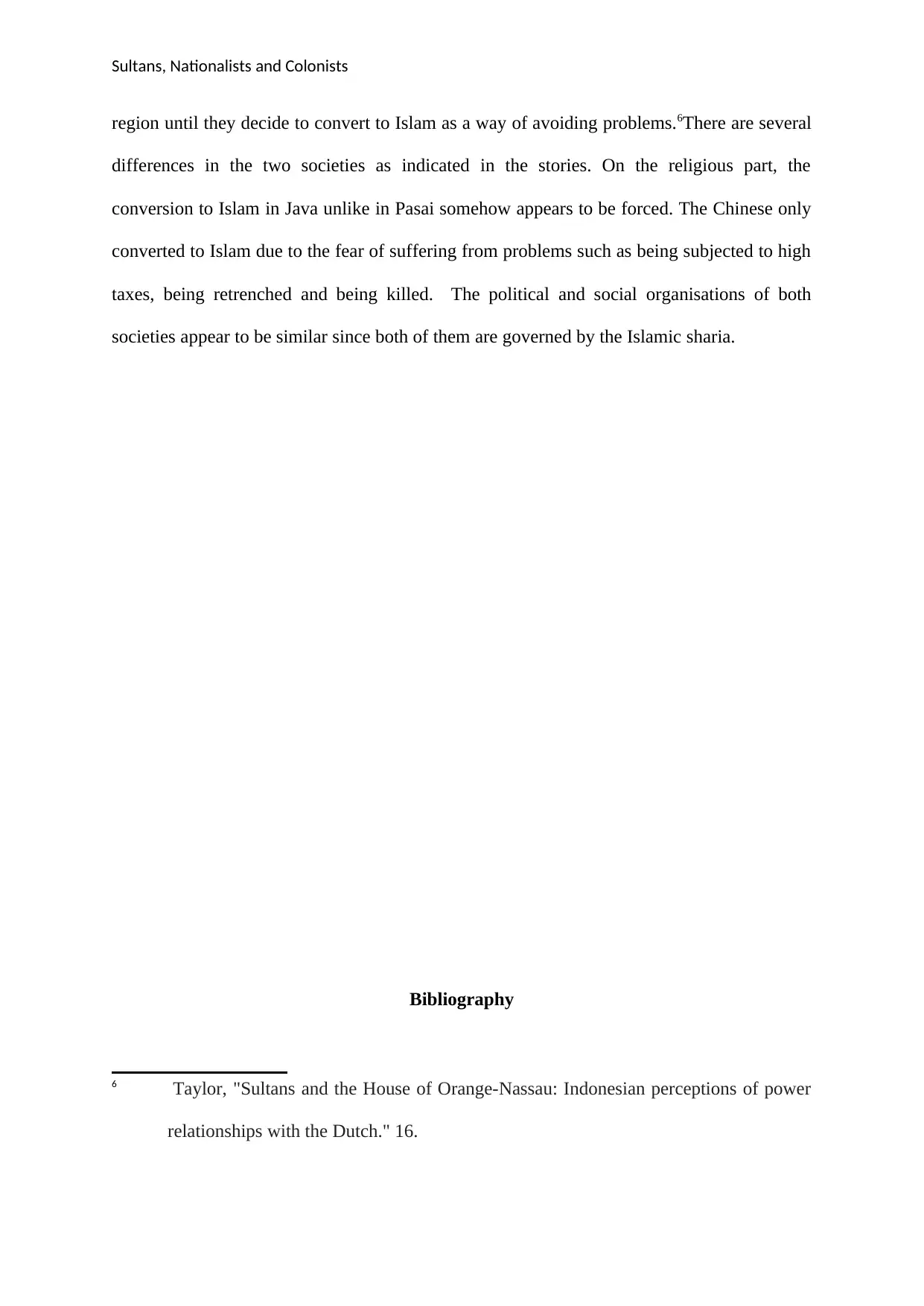
Sultans, Nationalists and Colonists
region until they decide to convert to Islam as a way of avoiding problems.6There are several
differences in the two societies as indicated in the stories. On the religious part, the
conversion to Islam in Java unlike in Pasai somehow appears to be forced. The Chinese only
converted to Islam due to the fear of suffering from problems such as being subjected to high
taxes, being retrenched and being killed. The political and social organisations of both
societies appear to be similar since both of them are governed by the Islamic sharia.
Bibliography
6 Taylor, "Sultans and the House of Orange-Nassau: Indonesian perceptions of power
relationships with the Dutch." 16.
region until they decide to convert to Islam as a way of avoiding problems.6There are several
differences in the two societies as indicated in the stories. On the religious part, the
conversion to Islam in Java unlike in Pasai somehow appears to be forced. The Chinese only
converted to Islam due to the fear of suffering from problems such as being subjected to high
taxes, being retrenched and being killed. The political and social organisations of both
societies appear to be similar since both of them are governed by the Islamic sharia.
Bibliography
6 Taylor, "Sultans and the House of Orange-Nassau: Indonesian perceptions of power
relationships with the Dutch." 16.
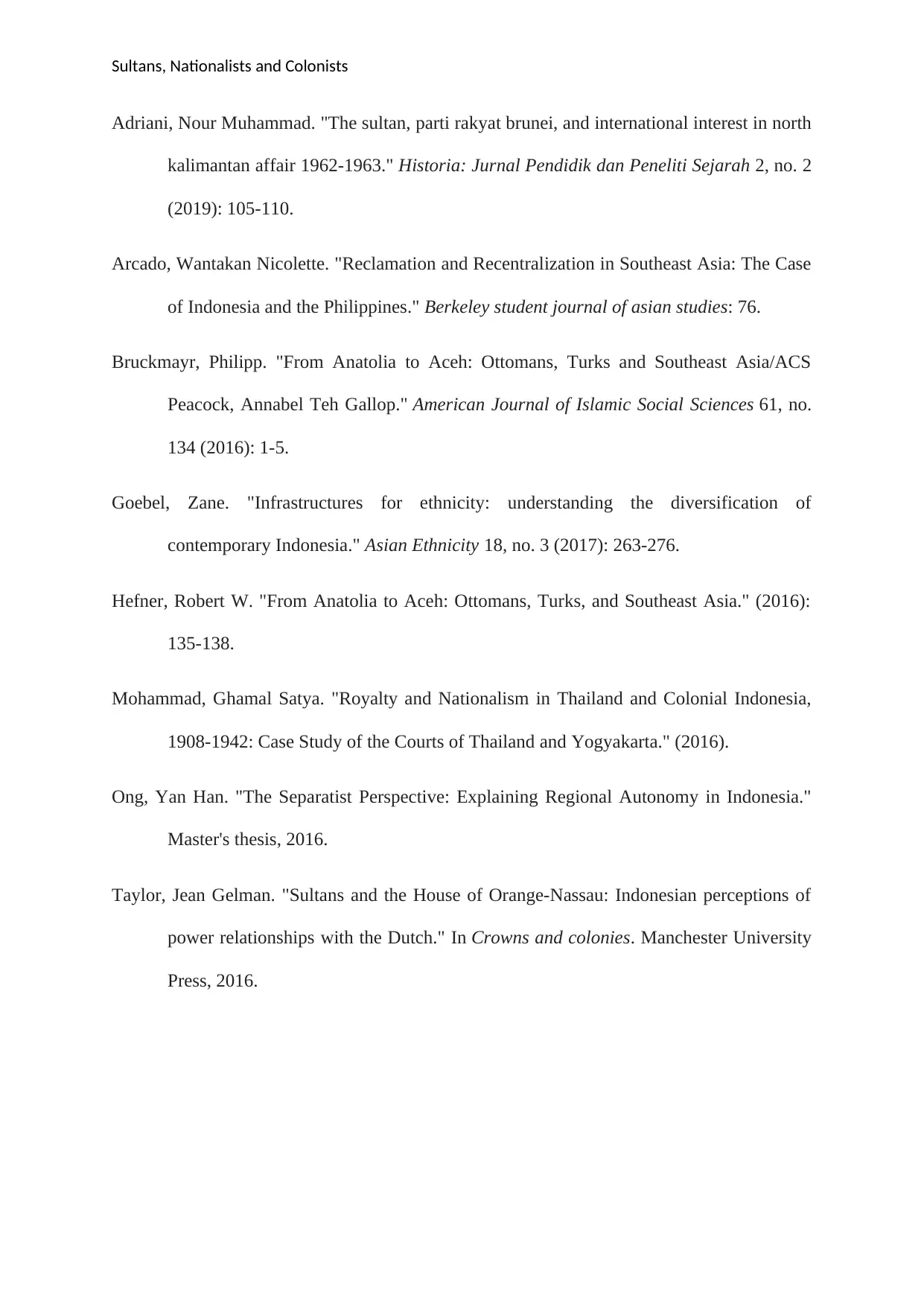
Sultans, Nationalists and Colonists
Adriani, Nour Muhammad. "The sultan, parti rakyat brunei, and international interest in north
kalimantan affair 1962-1963." Historia: Jurnal Pendidik dan Peneliti Sejarah 2, no. 2
(2019): 105-110.
Arcado, Wantakan Nicolette. "Reclamation and Recentralization in Southeast Asia: The Case
of Indonesia and the Philippines." Berkeley student journal of asian studies: 76.
Bruckmayr, Philipp. "From Anatolia to Aceh: Ottomans, Turks and Southeast Asia/ACS
Peacock, Annabel Teh Gallop." American Journal of Islamic Social Sciences 61, no.
134 (2016): 1-5.
Goebel, Zane. "Infrastructures for ethnicity: understanding the diversification of
contemporary Indonesia." Asian Ethnicity 18, no. 3 (2017): 263-276.
Hefner, Robert W. "From Anatolia to Aceh: Ottomans, Turks, and Southeast Asia." (2016):
135-138.
Mohammad, Ghamal Satya. "Royalty and Nationalism in Thailand and Colonial Indonesia,
1908-1942: Case Study of the Courts of Thailand and Yogyakarta." (2016).
Ong, Yan Han. "The Separatist Perspective: Explaining Regional Autonomy in Indonesia."
Master's thesis, 2016.
Taylor, Jean Gelman. "Sultans and the House of Orange-Nassau: Indonesian perceptions of
power relationships with the Dutch." In Crowns and colonies. Manchester University
Press, 2016.
Adriani, Nour Muhammad. "The sultan, parti rakyat brunei, and international interest in north
kalimantan affair 1962-1963." Historia: Jurnal Pendidik dan Peneliti Sejarah 2, no. 2
(2019): 105-110.
Arcado, Wantakan Nicolette. "Reclamation and Recentralization in Southeast Asia: The Case
of Indonesia and the Philippines." Berkeley student journal of asian studies: 76.
Bruckmayr, Philipp. "From Anatolia to Aceh: Ottomans, Turks and Southeast Asia/ACS
Peacock, Annabel Teh Gallop." American Journal of Islamic Social Sciences 61, no.
134 (2016): 1-5.
Goebel, Zane. "Infrastructures for ethnicity: understanding the diversification of
contemporary Indonesia." Asian Ethnicity 18, no. 3 (2017): 263-276.
Hefner, Robert W. "From Anatolia to Aceh: Ottomans, Turks, and Southeast Asia." (2016):
135-138.
Mohammad, Ghamal Satya. "Royalty and Nationalism in Thailand and Colonial Indonesia,
1908-1942: Case Study of the Courts of Thailand and Yogyakarta." (2016).
Ong, Yan Han. "The Separatist Perspective: Explaining Regional Autonomy in Indonesia."
Master's thesis, 2016.
Taylor, Jean Gelman. "Sultans and the House of Orange-Nassau: Indonesian perceptions of
power relationships with the Dutch." In Crowns and colonies. Manchester University
Press, 2016.
⊘ This is a preview!⊘
Do you want full access?
Subscribe today to unlock all pages.

Trusted by 1+ million students worldwide
1 out of 6